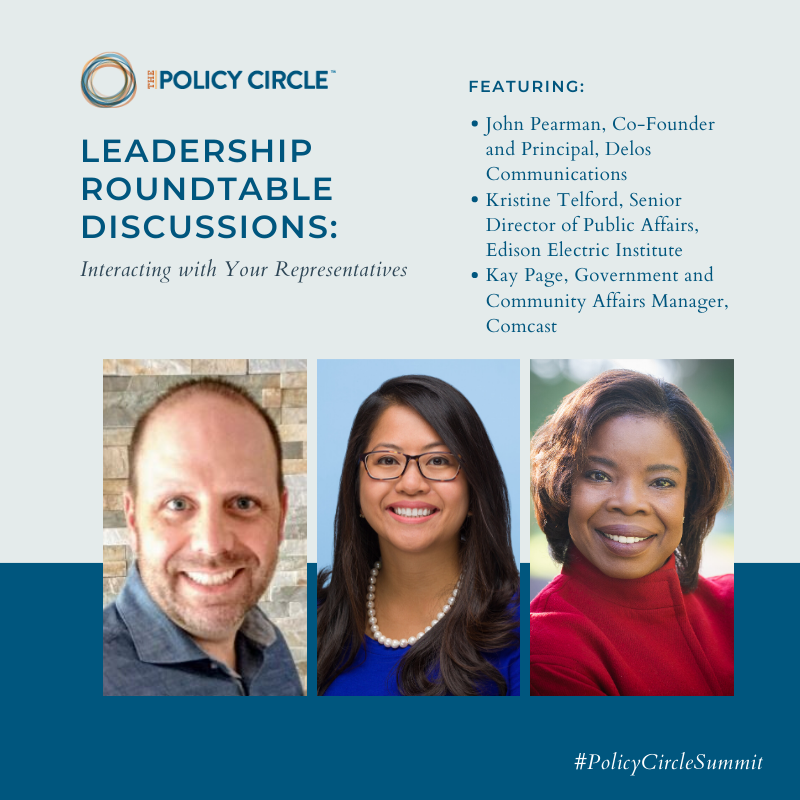On Friday, November 15, engaged community members, Circle leaders, and influencers from across the country convened in Chicago for the 4th Policy Circle Leadership Summit. More than 350 women and men participated in conversations and workshops that encouraged them to think about the broad implications of living and leading in a connected world while honing their leadership and engagement skills. The following is a recap from the Interacting with Elected Officials Workshop presented at the Summit.
Speakers:
Kay Page, Comcast; Woodridge Village Trustee
Kristine Telford, Edison Electric Institute
John Pearman, Delos Communications
Nicole Cline, The Policy Circle
Even at the local or regional level, elected officials can still seem distant to most citizens. This is among the reasons why it is essential to interact with representatives. Representatives rarely hear from the people who live and work in the districts they represent, but they need the input and expertise from their constituents to better inform their votes. Remember: Lawmakers are not experts. They rely on experts and constituents like you!
Here’s a framework – Identify – Engage – Activate:
- Introduce — who are your representatives locally, at the state level and federally. Decide who you want to build rapport with. Start local, many politicians have deep network across a city, a state and the nation, so one local connection will lead to many. Start where you work and where you live, learn about the person that you want to interact with what committee they are on, what is their occupation and focus. etc.
- Engage — the quote to remember here is, “Dig the well before you are thirsty” so take the time to build rapport. Here are some starting points:
- Offer yourself as a resource to your lawmaker if you are particularly interested or have expertise in an area.
- Ask your lawmakers what their priorities are so you can find ways to work together.
- If you don’t agree with your lawmakers positions or approach, consider areas of common ground based on shared priorities.
- Send an email to your lawmaker, or even better, call them about important issues. Calling your legislator is the most effective way to engage.
- Share your story. Everyone has a unique perspective about what is happening in their community. Your experience is important for your representative to hear.
- Sign up for their newsletter and visit their website to learn about upcoming public meetings they might attend so you can introduce yourself in person. Invite your circle members!
- Activate — follow the activities of your town hall and legislature to learn early what is being discussed and drafted so you can share your perspective.
By establishing relationships and building trust with elected officials, you have the ability to bring to your lawmakers’ attention something no one else may have talked to them about.
Considerations for your community:
- Do you know who your local elected representatives are? Did you participate in the most recent local or municipal elections?
- Do you maintain a relationship with an elected representative in the communities where you work or live? Are you part of an association that interacts with elected officials? Who is in charge of that relationship, and is there a way to be more involved?
Here are some tools that you can use:
Engaging with Members of Congress
How to Build a Relationship with Your Legislator
Sample Letter to Your Local Representatives
About The Policy Circle

Founded in 2015, The Policy Circle provides a fact-based, nonpartisan framework that inspires women living in the same community to connect, learn about and discuss public policies that impact every American. The Policy Circle’s vision is that women across the nation are connected and engaged in their communities, openly sharing their views and taking a leadership role in public policy dialogue on what human creativity can accomplish in a free market economy.
In just four years, The Policy Circle has grown to over 3,500 members in more than 296 Circles in 40 states and 3 continents. Based on organic networks of women, it is one of the fastest growing national organizations empowering women to gain the knowledge and confidence to become policy leaders.




